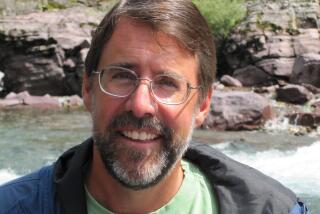J. David Love, 89; Renowned Geologist, Environmentalist
- Share via
LANDER, Wyo. — Reared on a hardscrabble Wyoming ranch where once he ate rattlesnake meat with a fugitive gunslinger, J. David Love rose from the plains to become a leading Rocky Mountain field geologist as well as a noted environmentalist who campaigned for the preservation of Wyoming’s delicate Red Desert.
Love, 89, who died Friday in Casper, Wyo., after suffering a debilitating stroke in June, mapped and surveyed much of this remote, mountainous territory rich in mineral resources. In an era of satellite imagery and computer analysis, Love was one of the last great field researchers in a profession that has been largely given over to laboratory geoscientists.
“We are never going to see a field geologist like Dave again. They just don’t train them like that,” former Wyoming legislator and Love’s friend Tom Stroock told the Casper Star-Tribune. “Dave’s specialty was out in the field, walking the fault lines, walking the escarpments and touching the rocks.”
Although Love was among the first to discover large deposits of uranium in Wyoming in the 1940s, he declined lucrative offers from private companies to help them exploit it, preferring the independence of his work as a teacher at the University of Wyoming and longtime director of the Wyoming State Geological Survey.
During World War II, Love was instrumental in unearthing supplies of strategic minerals, including vanadium, which was used for armor plates on ships, tanks and aircraft.
The powerfully built geologist was renowned for his endurance during long research treks into the rugged Absaroka Range east of Yellowstone National Park that he continued well into his 80s.
“He could look at the way trees were growing and from watching the habits of animals and tell you what happened there geologically hundreds and even thousands of years before,” said Jackson Hole investor Tom Chrystie, who accompanied Love to the Absarokas three years ago.
Jane, Love’s wife of 62 years, said the family planned to scatter his ashes in the Absaroka Range he loved. “But it’s going to take horses to get in there where he wanted them,” she said Tuesday. In addition to his wife, Love is survived by four children and seven grandchildren.
In 1992, David and Jane Love donated an acre of land they owned in a prime area of Jackson, the extremely expensive Wyoming mountain resort town, to build 15 units of affordable housing.
It was an act reflective of Love’s lifelong social consciousness. Love was one of the earliest geologists to worry about the relationship of mining to environmental and human health.
When the Geological Society of America presented him with its first Legendary Geoscientist Award in 1999, Love told the audience: “I don’t think we could make a better contribution to geology and human health than to tie them together.”
Born in Riverton in 1913, Love joked that he got into geology because as a child “there wasn’t anything else to see where I was, except the rear end of a cow 15 hours a day.”
The courtship and marriage of Love’s Scottish rancher father and Wellesley educated schoolteacher mother was detailed in the 1986 book “Rising From the Plains” by John McPhee. The family used pages of the New York Times to insulate the walls of their Muskrat Basin homestead in the Wind River Valley.
Love and his brother were taught at home by their mother--who instructed them in classical Greek and Latin as well as French--until high school.
When she was not teaching her two boys, Ethel Phoebe Waxham Love warded off attacks by roving bands of wild dogs.
After earning his bachelor’s and master’s degrees from the University of Wyoming, Love attended Yale University, where he earned his doctorate in 1938.
The author of more than 250 geological publications, including two geological maps of Wyoming, Love trained 25 other geologists in his style of field research.
In “Rising From the Plains,” McPhee described Love as the “grand old man of Rocky Mountain geology.”
His research led to exploitation of mineral resources in his home state.
But his activism on preserving the wilderness made him a hero to environmentalists.
In 2000, Love supported a plan--fiercely opposed by the oil and gas industry--by former Interior Secretary Bruce Babbitt to manage drilling in the Red Desert.
“He was a contradiction of sorts,” said friend Tom Bell, founder of High Country News, who said Love was the first contributor to his environmental publication.
“He saw what was happening to the open range but he also felt the economic needs of the state.”
In that respect, few men have more personified the beauty and the bounty of Wyoming and the mountain West.
“He carries within himself some of the central paradoxes of his time,” wrote McPhee.
“Among environmentalists he seems to me a good deal less lopsided than many, although beset by contradictory interests, like the society he serves.”
McPhee, who visited Love in the Casper hospital in the days before his death, recalled a trip he took with Love in the Wind River Range, near South Pass, where the two men saw a large open-pit iron mine.
The mine, since closed, employed several hundred people from the nearby town of Lander. McPhee asked Love what he felt about the mine.
“They’ve only ruined one side of the mountain,” Love said.
“Behind the pit, the range top is covered with snow. I can live with this. This is part of the lifeblood of our nation.”
More to Read
Sign up for Essential California
The most important California stories and recommendations in your inbox every morning.
You may occasionally receive promotional content from the Los Angeles Times.










